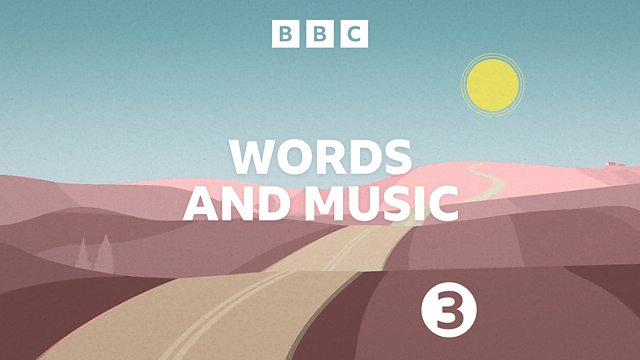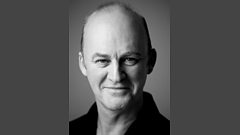
Encoded
Texts and music inspired by codes, with readers Anna Maxwell Martin and Tim McInnerny. Including Conan Doyle, Greene, Le Carre and Agatha Christie, plus Bach, Shostakovich, Berg.
Today's Words and Music has more to it than meets the eye. Anna Maxwell Martin and Tim McInnerny read texts and poetry inspired by codes, and hidden messages. Codes are a staple in detective and spy novels, and we find characters sending and grappling with them in works by Conan Doyle, Graham Greene and John le Carré. There are also real life examples of codes being used, and broken, from Francis Bacon's ingenious cypher, Mary Queen of Scots' fatal coded letters during her imprisonment by Elizabeth I, and the top-secret work at Bletchley Park during the Second World War. The programme also includes clue-ridden text and poems, such as Agatha Christie's Manx Gold which contained cryptic clues to the whereabouts of hidden treasure prizes on the Isle of Man. There are acrostic poems with the names of loved ones hidden within them, and in a similar way, composers often embedded their own, or another's initials into their music - there are examples by Bach, Shostakovich and Berg.
Producer Ellie Mant.
Last on
Music Played
Timings (where shown) are from the start of the programme in hours and minutes
-
Ella Cheever Thayer
Wired Love: A Romance of Dots and Dashes, read by Anna Maxwell Martin
![]() 00:01
00:01John Adams
Phrygian Gates (extract)
Performer: Ralph van Raat (piano).- NAXOS 8.559285.
- Tr1.
Thomas Young
An account of some recent discoveries in hieroglyphical literature and Egyptian antiquities, read by Tim McInnerny
![]() 00:05
00:05Wolfgang Amadeus Mozart
The Magic Flute: O Isis and Osiris
Performer: The Monteverdi Choir, English Baroque Soloists, John Eliot Gardiner (conductor).- ARCHIV 4491662.
- CD2 tr16.
John Cage
Writing Through Howl, read by Anna Maxwell Martin
![]() 00:08
00:08John Cage
The Wonderful Widow of Eighteen Springs
Performer: Natalia Pschenitschnikova (voice), Alexei Lubimov (piano lid).- ECM 4764922.
- Tr2.
John le Carre
A Perfect Spy, read by Tim McInnerny
![]() 00:11
00:11Alfred Schnittke
Moz-Art a la Haydn (extract)
Performer: Tapiola Sinfonietta.- BISCD1437.
- Tr2.
Agatha Christie
Manx Gold, read by Anna Maxwell Martin
![]() 00:15
00:15Haydn Wood
Rhapsody Mylecharane (extract)
Performer: Czecho-Slovak Radio Symphony Orchestra, Adrian Leaper (conductor), James Wood (conductor).- MARCO POLO 8.223402.
- Tr7.
Ralph Bennett
Code Breakers, read by Tim McInnerny
![]() 00:20
00:20Dmitry Shostakovich
String Quartet no.8; 1st movement
Performer: Fitzwilliam String Quartet.- DECCA 4214752.
- Tr6.
Richmal Crompton
Williams Crowded Hours, read by Anna Maxwell Martin
![]() 00:26
00:26Robert Schumann
Carnaval: Chopin
Performer: Stephen Hough (piano).- HYPERION CDA67996.
- Tr19.
Edgar Allan Poe
An Enigma, read by Tim McInnerny
![]() 00:28
00:28Edward Elgar
Enigma Variations: Dorabella
Performer: London Symphony Orchestra, Colin Davis (conductor).- PHILIPS 442652-2.
- Tr11.
Francis Bacon
The Advancement of Learning, read by Anna Maxwell Martin
![]() 00:32
00:32Guillaume Dufay
Nuper Rosarum Flores (extract)
Performer: The Hilliard Ensemble.- EMI CDC7476282.
- Tr6.
Graham Green
Our Man in Havana, read by Tim McInnerny
![]() 00:36
00:36Philip Glass
The Secret Agent
Performer: Cello Octet Iberico.- CODAEX CX4005.
- Tr5.
Anne Lister
I know my own Heart, read by Anna Maxwell Martin
![]() 00:41
00:41Erik Satie
Musiques Intime et Secretes: Nostalgie
Performer: Steffen Schleiermacher (piano).- MDG61310662.
- Tr32.
Rudyard Kipling
Code of Morals, read by Tim McInnerny
![]() 00:45
00:45Carl Teike
Old Comrades (extract)
Performer: Philip Jones Ensemble, Elgar Howarth (conductor).- DECCA 4173292.
- Tr4.
Simon Singh
The Code Book: The Secret History of Codes and Code-Breaking, read by Anna Maxwell Martin
![]() 00:48
00:48William Byrd
Mass for four voices: Agnus Dei
Performer: The Tallis Scholars, Peter Phillips (conductor).- GIMELL CDGIM345.
- Tr10.
![]() 00:51
00:51Alban Berg
Lyric Suite: 1st movement (extract)
Performer: Cincinnati Symphony Orchestra, Michael Gielen (conductor).- ALLEGRIA 221017205.
- Tr6.
Samuel Daniel
Eyes Hide my Love, read by Tim McInnerny
Nancy Mitford
Pigeon Pie, read by Anna Maxwell Martin
![]() 00:55
00:55Johannes Brahms
FAE Sonata movement (extract)
Performer: Tasmin Little (violin), John Lenehan (piano).- CLASSICS FOR PLEASURE 5856152.
- Tr6.
Lewis Carroll
A Boat Beneath a Sunny Sky, read by Tim McInnerny
![]() 00:58
00:58Maurice Ravel
Minuet on the name of Haydn
Performer: Christian Zacharias (piano).- EMI 5570292.
- CD1 tr9.
PG Wodehouse
Summer Moonshine, read by Anna Maxwell Martin
![]() 01:01
01:01Ruggero Leoncavallo
Pagliacci: Vesti la Giubba (extract)
Performer: Jose Carraras (tenor), Philharmonic Orchestra, Riccardo Muti (conductor).- EMI CMS7636502.
- CD2 tr15.
Arthur Conan Doyle
The Adventure of the Dancing Men, read by Tim McInnerny
![]() 01:04
01:04Miklós Rózsa
The Private Life of Sherlock Holmes: Holmes Morse Code (extract)
Performer: The City of Prague Philharmonic Orchestra, Nic Raine (conductor).- TADLOW MUSIC TADLOW004.
- Tr18.
Czselaw Milosz, translated by Czeslaw Milosz and Robert Hass
Meaning, read by Anna Maxwell Martin
![]() 01:06
01:06Johann Sebastian Bach
A Musical Offering: Ricercar a 6
Performer: Lucerne Festival Strings, Achim Fiedler (conductor).- OEHMS OC301.
- Tr1.
Producer's Note
Today's Words and Music has more to it than meets the eye. Anna Maxwell Martin and Tim McInnerny read texts and poetry inspired by codes, and hidden messages. Codes are a staple in detective and spy novels, and there are also real life examples of codes being used, and broken. There are acrostic poems with the names of loved ones hidden within them, and in a similar way, pieces of music with the composer’s name or initials spelled out in musical note form.
The programme begins with a romance conducted over the wire between two telegraph operators; the noise of dots and dashes made by the sounder reminded me of John Adams’ minimal music, and I like that the ‘gates’ in the title of his Phrygian Gates is a reference to electronic music. English scientist Thomas Young was instrumental in deciphering the Egyptian hieroglyphs on the Rosetta Stone, and I’ve paired this with the chorus to the Egyptian gods Isis und Osiris from The Magic Flute. Along with elements of Egyptomania so popular at the time, Mozart also included many hidden references to Freemasonry in his opera. Next, to a poem by John Cage which he described as being mesostic; similar to acrostic, with a word or name hidden in the text, in this case the name of the poet Allen Ginsberg. This is followed by Cage’s Wonderful Widow of Eighteen Springs, for soprano and closed piano, which set a passage from Joyce’s Finnegans Wake.
A programme about codes wouldn’t be complete without a few spy stories. After an extract from le Carre’s A Perfect Spy, there’s music by Schnittke which incorporates Mozart and Haydn in his own inimitable style. Next, to a publicity stunt from the Isle of Man tourist board, which commissioned Agatha Christie to write a coded poem to lead treasure hunters to buried prizes on the island. Her Manx Gold is followed by a Manx Rhapsody by Haydn Wood. Ralph Bennett was one of the real-life code-breakers working at Bletchley Park during WW2. His description of Hut 3 is paired with a movement from Shostakovich’s String Quartet no.8, composed during a trip to Dresden in memory of victims of fascism and war. This is one of many of Shostakovich’s pieces to use his initials as a musical motif. A slightly less competent spy than Le Carre’s is Richmal Crompton’s William, as he directs his imaginary secret service men on another vital mission, with music by Schumann which is riddled with musical cryptograms. ��Poe’s poem An Enigma has the name of his friend Sarah Anna Lewis hidden within it, which has an obvious parallel with Elgar’s Enigma Variations; his Dorabella movement gently parodies his friend’s stutter.
One of the most famous ciphers is that invented by Francis Bacon, in which two codes are folded up together, the non-significant one disguising the real one. This reminded me of Dufay’s motet Nuper rosarum flores, which uses the same melody at two different pitch levels and with interlocking rhythms to represent the structural pattern of Florence Cathedral. ��Next, to a character who becomes a spy by mistake in Graham Green’s Our Man in Havana, accompanied by Philips Glass’ music for the film The Secret Agent. Codes are often used in letters and in diaries to hide the author’s innermost thoughts from prying eyes; I chose a diary extract from Anne Lister, who was unusual for being an openly gay woman in the 19th century.
����������Բ�’s Code of Morals illustrates what can go wrong when a code is deciphered by the wrong person. Mary Queen of Scots discovered this too while she was imprisoned by Elizabeth I; she was so confident in her encrypted letters that she was too explicit about her treasonous plans. I followed this with part of Williams Byrd’s Mass for Four Voices, which sets words of the Catholic Mass; a risky tactic in post-Reformation England. A poem by Samuel Daniel describes the coded looks between lovers, and Berg’s Lyric Suite which follows contains a hidden reference to Hanna Fuchs-Robettin with whom he was secretly in love. Nancy Mitford’s characters attempt to wink in morse code, accompanied by Brahms’ contribution to the FAE Sonata, which uses those letters as a musical cryptogram to represent the phrase frei aber einsam (free, but lonely, the dedicatee Joachim’s personal motto).
Lewis Carroll’s acrostic poem A Boat Beneath a Sunny Sky is based on Alice Pleasance Liddell’s name, and the following Minuet by Ravel spells out Haydn’s name in note-form.�� Wodehouse’s characters attempt the encrypted pleasures of a crossword puzzle, before we hear about code-breaking by the most famous sleuth of all – Sherlock Holmes. Finally a poem by Czelaw Milosz ponders whether there is a true meaning or pattern to the world, and the programme ends with Bach’s Ricercar a 6 from the Musical Offering, one of several of his works to incorporate his name as a musical signature.��
Ellie Mant - Producer
��Broadcast
- Sun 18 Dec 2016 19:00����ý Radio 3
Featured in...
![]()
Arts
Creativity, performance, debate
The hidden history of plant-based diets
Books website
Get closer to books with in-depth articles, quizzes and our picks from radio & TV.
Gallery




